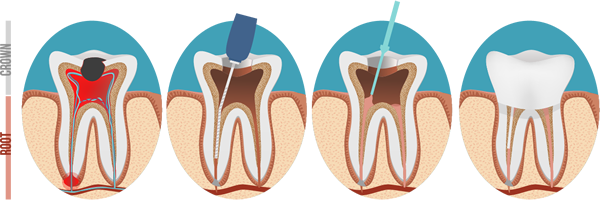Root Canal Treatment
- What is a Root Canal?
- Do I Need a Root Canal?
- Does a Root Canal Hurt?
- Root Canal Procedure
- How Long is a Root Canal?
- Root Canal Recovery
- Choosing a Root Canal Dentist
- Root Canal Cost
- Additional Root Canal FAQs
What is a Root Canal?
 Root canal treatment is typically required when the pulp of tooth’s root (the inner tooth and nerves) becomes infected. In most cases, this infection is accompanied by severe pain. To preserve as much of the tooth structure as possible and prevent the need for a tooth extraction, a root canal treatment is performed to eliminate the infection. Our dentist, Jason Keckley, DMD, uses the latest techniques for root canal treatment to maximize patient comfort.
Root canal treatment is typically required when the pulp of tooth’s root (the inner tooth and nerves) becomes infected. In most cases, this infection is accompanied by severe pain. To preserve as much of the tooth structure as possible and prevent the need for a tooth extraction, a root canal treatment is performed to eliminate the infection. Our dentist, Jason Keckley, DMD, uses the latest techniques for root canal treatment to maximize patient comfort.
How Do I Know If I Need a Root Canal?
An infection within a tooth’s root can be caused by untreated tooth decay, a chipped tooth, or a crack in the tooth’s structure. Most patients with an infection will experience sharp or intense pain that may become amplified when chewing or speaking. Additional symptoms of this type of infection can include:
- Aching
- A feeling of pressure
- Swollen gums
- Tenderness around the tooth
- Lingering discomfort after eating food at extreme temperatures
Does a Root Canal Hurt?
Modern root canal treatments are designed to minimize any discomfort you may experience. A local anesthetic can thoroughly numb the affected area and prevent you from feeling pain during the procedure. For patients who suffer from dental phobia or extreme anxiety, sedation dentistry techniques are available to maximize your comfort.
What Happens During a Root Canal Procedure?
Although some root canal procedures can be completed in a single office visit, many require two office visits to give the infection time to fully heal. During the first visit, before the root canal procedure begins, a local anesthetic is used to numb the infected area. Once this area is numb, Dr. Keckley can enter the tooth through the crown and remove any infected pulp. The inside of the tooth’s root can then be cleaned and enlarged. In many cases, this emptied space is sealed with a temporary filling.
At the time of the second visit, the temporary filling will be removed and Dr. Keckley will sterilize the chamber of the tooth. Finally, a permanent filling or dental crown will be used to seal the tooth from future infections. At this time, patients will be able to resume chewing with comfort.

How Long Does a Root Canal Take?
Each root canal is unique to the needs of the patient, and the majority can be completed during either one or two appointments. Each appointment typically lasts between 60 and 90 minutes depending on the complexity of the procedure. Longer treatment times are generally associated with root canals on molars and teeth that are badly infected and/or severely damaged. For teeth that require “retreatment” after a previously unsuccessful root canal, two appointments are usually customary.
What is Root Canal Recovery Like?
Following a root canal it is common to experience some sensitivity and tenderness. We find that over-the-counter pain relievers are typically sufficient for alleviating discomfort as you recover. It is important to take proper care of the affected tooth by practicing good oral hygiene and not biting down directly onto the tooth until the final restoration has been placed. Within a few days after your root canal, any sensitivity or discomfort should be completely resolved. Patients who experience pain, sensitivity, or discomfort that lasts beyond a few days are instructed to contact our office. An immediate appointment may be necessary to check for and resolve any concerns that may be causing the problem. At Coronado Classic Dentistry your comfort, health, and safety are always our first priorities.
How Do I Choose a Root Canal Dentist?
When you choose a dentist to perform your root canal, it is helpful to pick one that has undergone some advanced training in endodontics and has experience performing many root canals. It is also important to select a dentist who is known for their work designing and crafting custom restorations for optimal aesthetics, durability, and/or function. For convenience and continuity of care, choosing a dentist like Dr. Keckley—who has the skill and technology to perform all stages of your root canal treatment under one roof—can be a huge benefit to you and the ultimate outcome of your procedure.
If you’d like to learn more about Dr. Keckley’s qualifications, credentials, training, and experience, we encourage you to contact Coronado Classic Dentistry to learn more.
How Much Does a Root Canal Cost?
Though there is no set price for a root canal, factors that influence the overall cost can include the level of decay or damage, and the complexity of the treatment plan. During the consultation process, Dr. Keckley can provide a detailed price quotation for a customized plan that meets your unique needs. Most patients with dental insurance will have a portion of the root canal treatment covered by their provider. Patients who would benefit from a monthly payment plan or low interest rates may take advantage of our financing options.
Frequently Asked Questions (FAQs) about Root Canals
My tooth doesn’t hurt. Do I still need a root canal?
In rare cases, patients may have an infection that does not cause any pain or discomfort. During the oral exam, Dr. Keckley can test the pulp of the tooth for damage or infection. When left untreated, infected pulp may eventually lead to tooth loss, even when there is no associated pain.
Why is a root canal better than pulling a tooth?
Dr. Keckley uses tooth extraction only in the most extreme circumstances. When the natural tooth structure is preserved, patients can maintain greater jawbone density, ultimately facilitating the ability to eat and speak with ease. Replacing a tooth with restorative solution, such as a dental implant, is also typically more expensive than a root canal treatment.
If you believe you are in need of a root canal or would like to schedule an oral exam with Dr. Keckley, please contact our office today.


